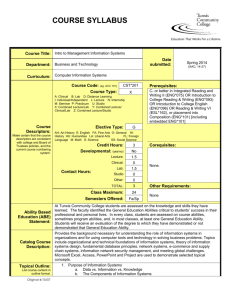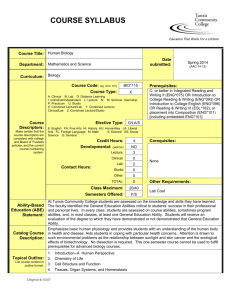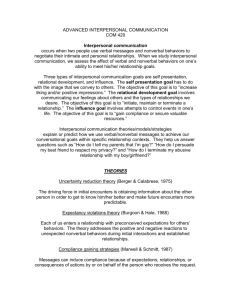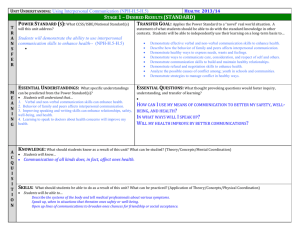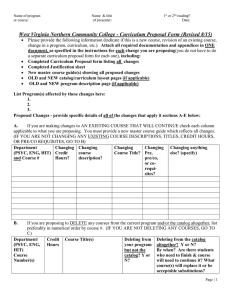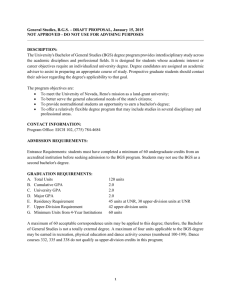Interpersonal Communication
advertisement
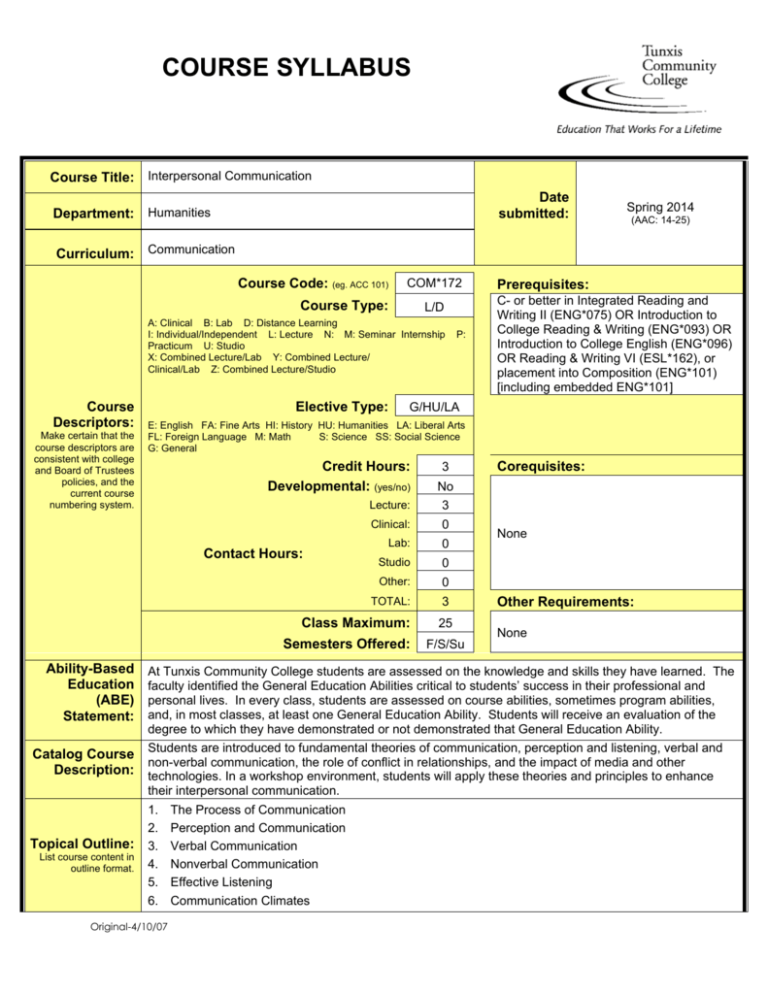
COURSE SYLLABUS Course Title: Interpersonal Communication Date submitted: Department: Humanities Spring 2014 (AAC: 14-25) Curriculum: Communication Course Code: (eg. ACC 101) COM*172 Course Type: L/D A: Clinical B: Lab D: Distance Learning I: Individual/Independent L: Lecture N: M: Seminar Internship Practicum U: Studio X: Combined Lecture/Lab Y: Combined Lecture/ Clinical/Lab Z: Combined Lecture/Studio Course Descriptors: Make certain that the course descriptors are consistent with college and Board of Trustees policies, and the current course numbering system. Elective Type: G/HU/LA E: English FA: Fine Arts HI: History HU: Humanities LA: Liberal Arts FL: Foreign Language M: Math S: Science SS: Social Science G: General Credit Hours: Developmental: (yes/no) Contact Hours: Topical Outline: List course content in outline format. Corequisites: No 3 Clinical: 0 Lab: 0 Studio 0 Other: 0 TOTAL: 3 Semesters Offered: Catalog Course Description: 3 Lecture: Class Maximum: Ability-Based Education (ABE) Statement: P: Prerequisites: C- or better in Integrated Reading and Writing II (ENG*075) OR Introduction to College Reading & Writing (ENG*093) OR Introduction to College English (ENG*096) OR Reading & Writing VI (ESL*162), or placement into Composition (ENG*101) [including embedded ENG*101] 25 F/S/Su None Other Requirements: None At Tunxis Community College students are assessed on the knowledge and skills they have learned. The faculty identified the General Education Abilities critical to students’ success in their professional and personal lives. In every class, students are assessed on course abilities, sometimes program abilities, and, in most classes, at least one General Education Ability. Students will receive an evaluation of the degree to which they have demonstrated or not demonstrated that General Education Ability. Students are introduced to fundamental theories of communication, perception and listening, verbal and non-verbal communication, the role of conflict in relationships, and the impact of media and other technologies. In a workshop environment, students will apply these theories and principles to enhance their interpersonal communication. 1. The Process of Communication 2. Perception and Communication 3. Verbal Communication 4. Nonverbal Communication 5. Effective Listening 6. Communication Climates Original-4/10/07 Interpersonal Communication 7. 8. 9. 10. 11. 12. Outcomes: Describe measurable skills or knowledge that students should be able to demonstrate as evidence that they have mastered the course content. COURSE SYLLABUS — page 2 Communication in Diverse Cultures and Communities Communication and Personal Identity Communication in Personal Relationships Group Communication Organizational Communication Mass Communication Upon successful completion of this course, the student will be able to do the following: COURSE: 1. identify principles and theories of effective interpersonal communication 2. analyze verbal and nonverbal behavior and their effects on personal relationships and organizational, group, and mass communication 3. utilize critical thinking and listening skills to evaluate communication practices in a variety of contexts PROGRAM: (Numbering reflects Program Outcomes as they appear in the college catalog) GENERAL EDUCATION: (Numbering reflects General Education Outcomes as they appear in the college catalog) 10. Social Phenomena - Students will develop an increased understanding of the influences that shape a person’s, or group’s attitudes, beliefs, emotions, symbols, and actions, and how these systems of influence are created, maintained, and altered by individual, familial, group, situational or cultural means. Demonstrates: Accurately and sufficiently explains factors that influence and shape a person’s or group’s attitudes, beliefs, decisions, and actions. Does Not Demonstrate: Inaccurately or insufficiently explains factors that influence and shape a person’s or group’s attitudes, beliefs, decisions, and actions. Evaluation: List how the above outcomes will be assessed. Assessment will be based on the following criteria: 1. evaluation of interpersonal communication in journals and/or essays 2. exams 3. quizzes Instructional Resources: List library (e.g. books, journals, on-line resources), technological (e.g. Smartboard, software), and other resources (e.g. equipment, supplies, facilities) required and desired to teach this course. Textbook(s) Required: Desired: Choose one of the following textbooks or provide alternate selection to Department Chair for approval: Communication Mosaics by Julia T. Wood Understanding Human Communication by Ronald B. Adler and George Rodman Essentials of Human Communication by Joseph A. DeVito Original-4/10/07
